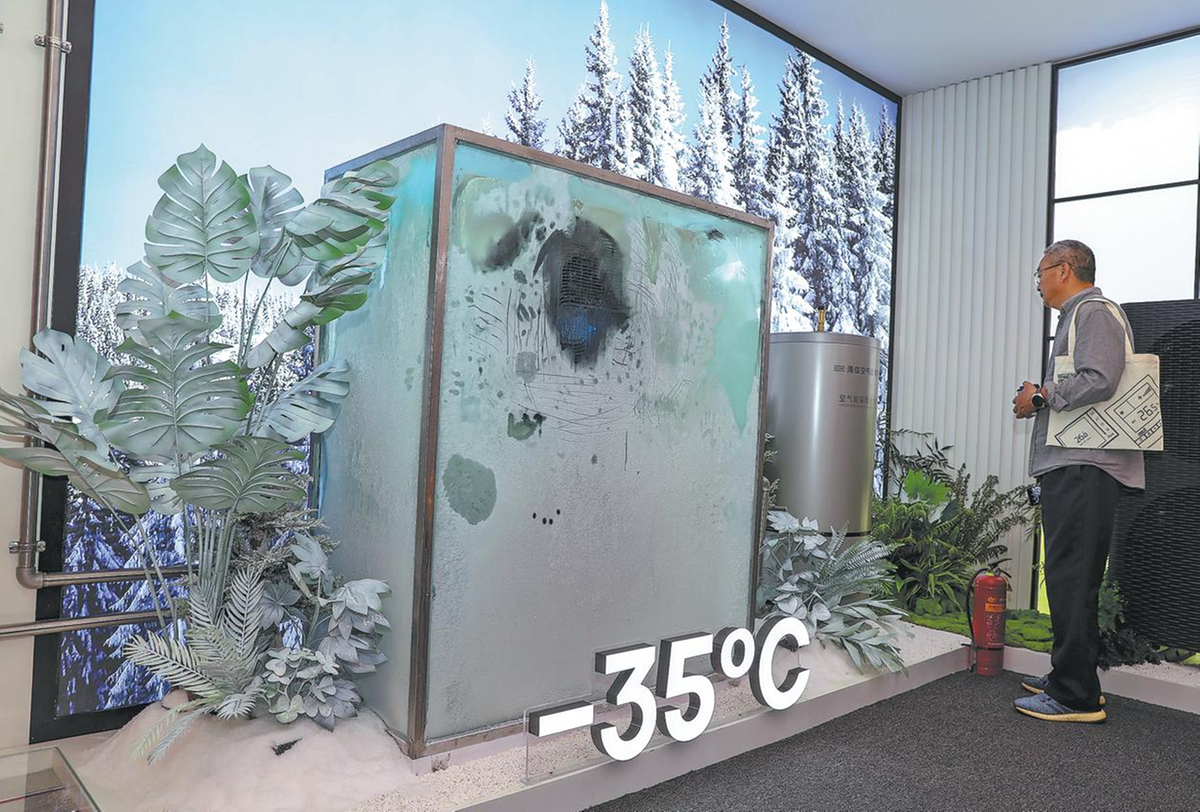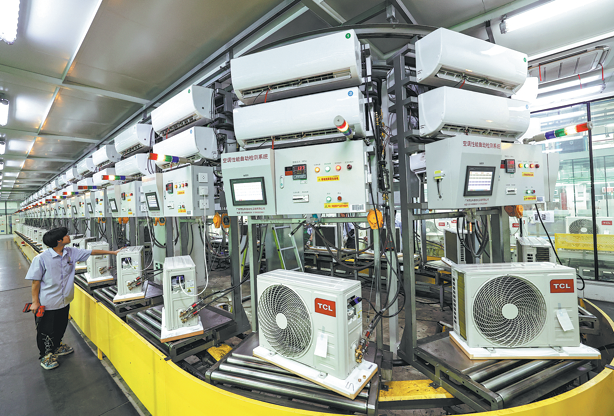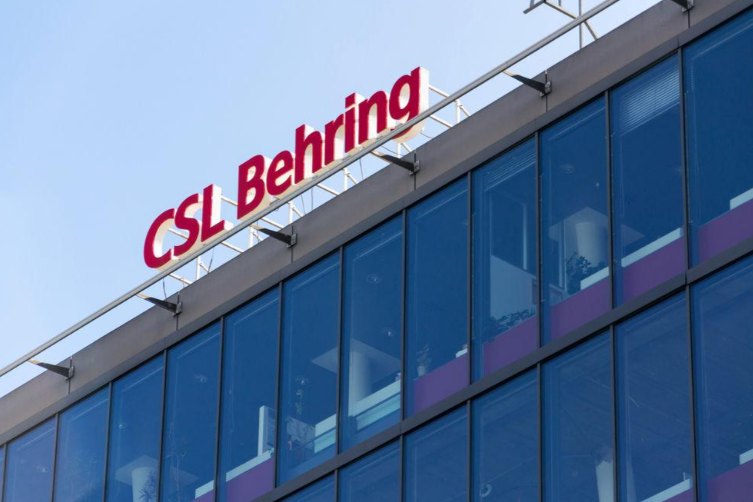AI ushers in friendlier appliances
Companies using smart tech to make home gadgets better suited for seniors


Smart air conditioners that can automatically adjust room temperature and artificial intelligence-powered televisions capable of broadcasting health information are increasingly penetrating into people's daily lives and becoming emotional companions for senior citizens in China.
As China's silver economy is witnessing robust growth, leading Chinese home appliance makers are stepping up efforts to launch products suitable for seniors — a demographic that has shown increasing demand for diversified, easy-to-use and health-oriented household appliances.
Experts said AI technologies are increasingly integrated into senior-friendly home appliances. With features such as intelligent voice interaction and health monitoring having been introduced, it will be more convenient for seniors to use these intelligent and innovative products, creating new consumption growth drivers.
Chinese home appliance giant Haier Group has developed AI-driven rehabilitation robots, which can provide personalized rehab plans based on the physical conditions of the elderly.
Its AI-powered TVs featuring an eye protection function can dynamically enhance image contrast, allowing elderly to see TV programs more clearly and comfortably. These products are equipped with medical large models to provide online consultation services, and can also automatically generate monthly health reports and send them to the smartphones of users.
Haier has rolled out toilets designed for seniors who have mobility issues, as well as showers and bathrooms with constant temperature control systems and voice recognition functionality.
Hisense Group has launched TVs integrating medical-level vision protection technology that aligns with the viewing habits and preferences of the elderly. Seniors can play games, engage in physical exercise, make purchases online and have video chats with their friends and family members via the intelligent TVs.
Its air conditioners combine the multiple functions of an air purifier, disinfection machine, dehumidifier, and humidity controller to provide a comprehensive solution for indoor air quality. In addition, elderly users can easily control air conditioners through simple voice commands through the advanced AI voice control system that can recognize dialects in different regions.
The company is also collaborating with top-tier hospitals across the nation to develop healthcare management platforms to monitor the health conditions of senior citizens.
Sichuan Changhong Electronics Holding Group Co Ltd has developed a smart eldercare system, enabling interconnections of home appliances, medical devices and security systems, and its AI-powered TV sets can understand the needs of seniors and remind them to take medications on time.
Data from Beijing-based market consultancy All View Cloud showed that the scale of China's senior-friendly home appliance market will exceed 100 billion yuan ($14.01 billion) in 2025 and is expected to reach 1 trillion yuan in 2030.
According to the Ministry of Civil Affairs, China's elderly population is projected to grow by more than 10 million annually over the next decade. By 2035, the silver economy is expected to account for 9 percent of China's GDP.
China's silver economy is expected to grow from 7 trillion yuan in 2024 to 30 trillion yuan in 2035, said the China Research Center on Aging. However, the elderly care products and services currently available in the market are not practical enough for senior citizens.
The country has released a guideline aimed at building a solid service system for the elderly by 2029, as part of a broader push to address the challenges of an aging population and improve the quality of life for seniors. The guideline said that services will be better matched with the needs of seniors by 2035.
According to the guideline, the central authorities encourage companies to develop and promote products for the elderly — either high-tech electrical appliances or tourism products — and enrich services for them, aiming for a prosperous silver economy.
In addition, the country will channel resources and investment into technological programs for elderly care services, such as humanoid robots and AI.
Jiang Feng, executive director of the China Household Electrical Appliances Association, said eyeing the immense business opportunities from China's silver economy and a rapidly aging population, major home appliance makers are pouring more resources into research and development and bolstering technological innovation of senior-friendly products, so as to satisfy the diversified demands of the expanding demographic.
Jiang said traditional home appliance products are highly homogenized, while the niche market targeting seniors is still in its initial stages, which will create immense business opportunities for home appliance companies. She highlighted that new-generation information technologies, such as 5G, AI and big data, are becoming increasingly integrated with elderly care products.
"Currently, most home appliance products are designed for ordinary consumers, without giving sufficient consideration to the needs of special user groups such as the elderly," said Guo Lizhen, a senior engineer of the China Household Electric Appliance Research Institute.
She noted that as China's aging population is rising rapidly, it is essential that product design and standards formulation should fully take into account the needs of the elderly, thus leading to the emergence of elderly friendly goods.
Nowadays, smart home appliances boast diverse functions, such as remote app control, voice interaction and touch screens, Guo said, emphasizing that no matter how advanced technologies have been deployed, elderly friendly appliances should give top priority to safety, followed by accessibility. Other factors like reliability and convenience should also be carefully considered.
She called for efforts to establish technical guidelines for the design, development and testing of the elderly friendly appliances and smart systems. The move will help break down barriers across different appliance brands, expand the effective supply of such products, and better meet the unique needs of elderly users, she added.
"With the help of AI, senior-friendly home appliances are creating safer, more comfortable and smarter home environments for silver-haired residents," said Liang Zhenpeng, an independent consumer electronics analyst.
Liang noted that as the elderly have increasing willingness and ability to consume products and services, household appliances should cater to their fundamental needs, while home appliance makers need to further expand application scenarios, striking a balance between technological iteration and user education.
China's smart home industry is developing by leaps and bounds, fueled by advances in cutting-edge technologies represented by AI, Liang said, adding that the integration of AI models with terminal devices and household appliances will create new growth drivers for the global consumer electronics industry, and advance the intelligent transformation of the traditional home appliances sector.
In order to meet the older generation's personalized needs and rising willingness and ability to spend on high-quality goods, he stressed the need to establish standards for senior-oriented home appliances and launch more intelligent home products containing innovative technologies, such as nursing and housekeeping robots for senior citizens.
To better cope with the aging population, the State Administration for Market Regulation has formulated and released a series of national standards for senior-friendly home appliances in recent years, including product operation methods, function settings, human-machine interaction interfaces and product safety.
Experts said these targeted measures basically establish the foundational framework of a national standard system for elderly friendly home appliances and intelligent systems.
"Younger consumers pay more attention to the abundant functionalities and personalized and customized products, while elderly users prefer simpler and more intuitive interfaces and function designs of household appliances, attaching great importance to the safety and convenience of such products," said Guo Jinyong, who is in charge of the smart home experience center at China's leading home furnishings retailer Easyhome.
In addition, seniors have a stronger need for health management features, such as health monitoring, smart reminders and emergency assistance. They also tend to buy products that can offer tailor-made health services in accordance with their physical conditions, Guo added.
Zhang Subing, chief expert at the China Electronics Standardization Institute, said more efforts should be made to establish comprehensive solutions covering demands, technology and application scenarios of household appliances for the elderly.
It is of vital importance to strengthen technological innovation, improve product design and enhance after-sales support for the elderly, with a key focus on integrating more AI-powered and health-oriented functions into intelligent terminal devices, he added.

Today's Top News
- Experts: Lai not freedom fighter, but a pawn of the West
- Hainan evolves as gateway to global markets
- Opening up a new bridge between China and world
- Tour gives China-Arab strategic trust a boost
- China accelerates push for autonomous driving
- Opening of new gateway can help foster global economic and trade cooperation






























